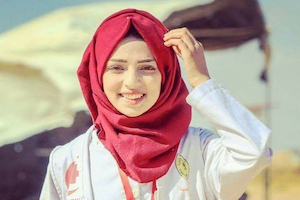Razan al-Najjar
/Overview
Razan al-Najjar born Gaza, Palestine September 11, 1999 (d. 2018). Paramedic nurse injured caring for wounded unarmed protesters April 2018; returned to be killed by Israeli sniper soldiers.
Quotations
“In our society women are often judged, but society has to accept us. If they don’t want to accept us by choice, they will be forced to accept us because we have more strength than any man. The strength that I showed the first day of the protests, I dare you to find it in anyone else.” (electronic intifada, Jun. 2, 2018)
“We have one goal—to save lives and evacuate people. And to send a message to the world: Without weapons, we can do anything.” (Washington Post, Jun. 2, 2018; photo +972 magazine)







